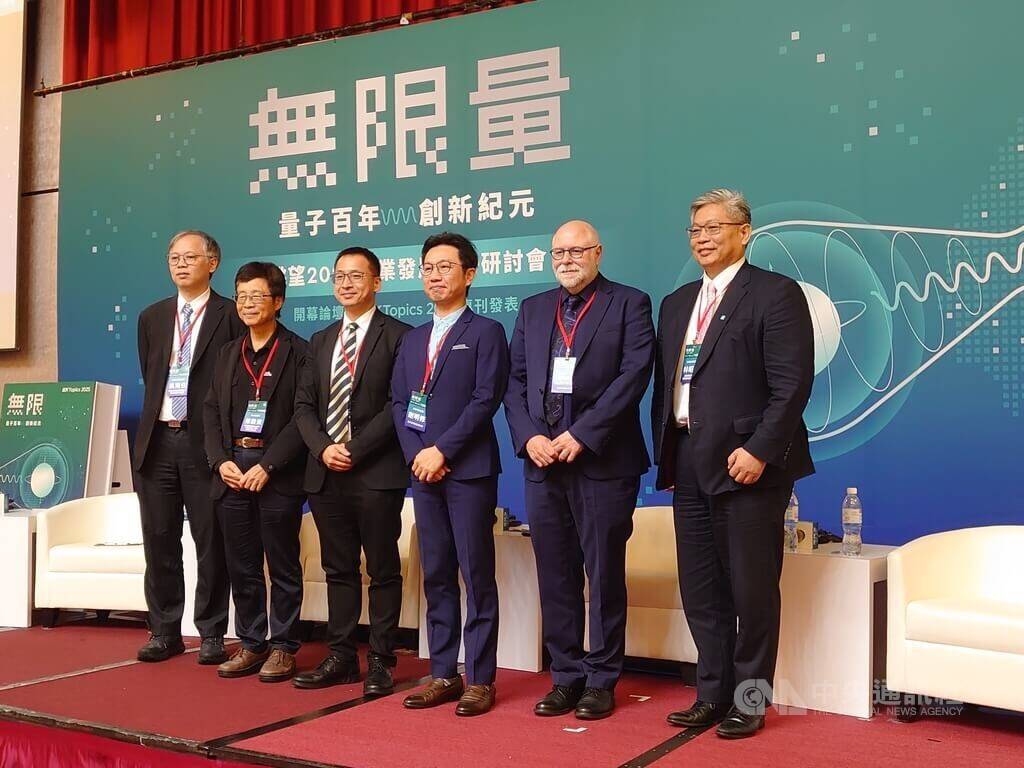Taiwan has an "absolute advantage" in semiconductors that it should leverage to build its own quantum computing ecosystem and cultivate local talent, an Academia Sinica fellow said yesterday.
Chen Chii-dong (陳啟東), a distinguished research fellow at Academia Sinica’s Research Center for Critical Issues and executive officer at the center’s thematic center for quantum computing, said developing a homegrown quantum computer would stimulate advances in related hardware and control software.
He said that Taiwan’s strength in semiconductor manufacturing could be harnessed to establish dedicated production processes and testing platforms, as chips are crucial to quantum computing performance.

Photo: CNA
Chen also emphasized the importance of education and the time needed for talent cultivation, saying that Taiwan currently welcomes talents from the fields of physics, information science, electrical engineering and electronics to enter the quantum domain.
Also yesterday, Jeff Lin (林昭憲), general director of the partially government-funded Industrial Technology Research Institute’s Industry, Science and Technology International Strategy Center, proposed several strategies to boost Taiwan’s quantum industry ecosystem.
First, Taiwan should leverage its advantages in its semiconductor and information and communications technology (ICT) industries, targeting core technologies and integrating them with artificial intelligence (AI) applications to create an innovative chain from research and development to market implementation.
Second, Lin suggested establishing a strategic research and supply chain partnership with developed places such as the US, countries in Europe and Japan, as well as boost industry-academia-research collaborations.
For quantum technology governance, Taiwan should construct a comprehensive framework that covers the issues of risk assessment, data sovereignty and ethics principles, he said.
Regarding talent management, the legal and education systems should be strengthened to cultivate cross-disciplinary talent, Lin added.
Lastly, Taiwan should set up a quantum research and verification platform that integrates innovation funds and resources to speed up commercialization and build an ecosystem of start-up incubation and innovation investment to transform research efforts into industrial energy, he said.
Lin said that quantum technology has become the new strategic frontier following AI, adding that 30 countries have already incorporated the field into their national development plans.
Taiwan’s strengths in semiconductors, medical technology, energy, automation and ICT provide a strong foundation for transforming quantum opportunities into practical advances, he said.

TRAFFIC SAFETY RULES: A positive result in a drug test would result in a two-year license suspension for the driver and vehicle, and a fine of up to NT$180,000 The Ministry of Transportation and Communications is to authorize police to conduct roadside saliva tests by the end of the year to deter people from driving while under the influence of narcotics, it said yesterday. The ministry last month unveiled a draft of amended regulations governing traffic safety rules and penalties, which included provisions empowering police to conduct mandatory saliva tests on drivers. While currently rules authorize police to use oral fluid testing kits for signs of drug use, they do not establish penalties for noncompliance or operating procedures for officers to follow, the ministry said. The proposed changes to the regulations require

The Executive Yuan yesterday announced that registration for a one-time universal NT$10,000 cash handout to help people in Taiwan survive US tariffs and inflation would start on Nov. 5, with payouts available as early as Nov. 12. Who is eligible for the handout? Registered Taiwanese nationals are eligible, including those born in Taiwan before April 30 next year with a birth certificate. Non-registered nationals with residence permits, foreign permanent residents and foreign spouses of Taiwanese citizens with residence permits also qualify for the handouts. For people who meet the eligibility requirements, but passed away between yesterday and April 30 next year, surviving family members

Taiwanese officials are courting podcasters and influencers aligned with US President Donald Trump as they grow more worried the US leader could undermine Taiwanese interests in talks with China, people familiar with the matter said. Trump has said Taiwan would likely be on the agenda when he is expected to meet Chinese President Xi Jinping (習近平) next week in a bid to resolve persistent trade tensions. China has asked the White House to officially declare it “opposes” Taiwanese independence, Bloomberg reported last month, a concession that would mark a major diplomatic win for Beijing. President William Lai (賴清德) and his top officials

The German city of Hamburg on Oct. 14 named a bridge “Kaohsiung-Brucke” after the Taiwanese city of Kaohsiung. The footbridge, formerly known as F566, is to the east of the Speicherstadt, the world’s largest warehouse district, and connects the Dar-es-Salaam-Platz to the Brooktorpromenade near the Port of Hamburg on the Elbe River. Timo Fischer, a Free Democratic Party member of the Hamburg-Mitte District Assembly, in May last year proposed the name change with support from members of the Social Democratic Party and the Christian Democratic Union. Kaohsiung and Hamburg in 1999 inked a sister city agreement, but despite more than a quarter-century of